Archived Storm Damage Blog Posts
What to Know About Weather Alerts To Keep Your Home Stay Safe | SERVPRO® of Buford/Suwanee/Hamilton Mill
7/12/2022 (Permalink)
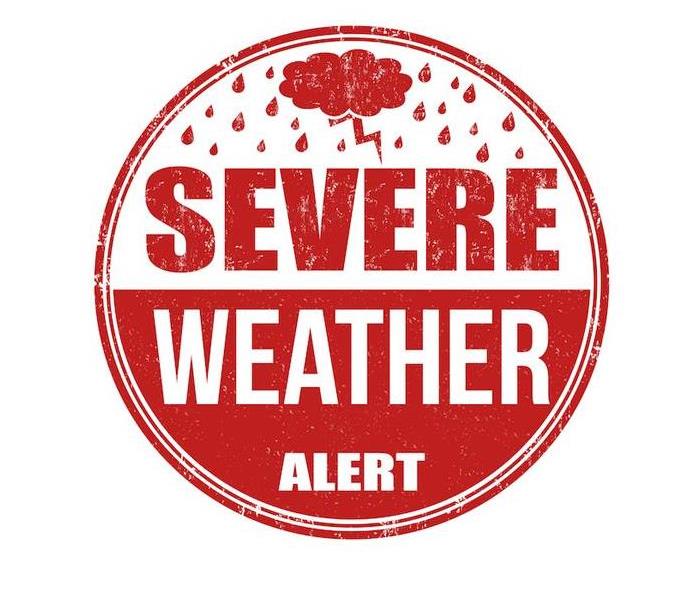 If you suspect any damage to your home from a recent storm, call SERVPRO of Buford/Suwanee/Hamilton Mill.
If you suspect any damage to your home from a recent storm, call SERVPRO of Buford/Suwanee/Hamilton Mill.
Did you know that severe weather has at least 42 different kinds of alerts divided into seven different categories? That is a lot of information to comprehend, especially when dark clouds and fierce winds are blowing in. When you understand what an alert means before it is sent out to our area, you can react swiftly and effectively. It also allows you to take action to defend your home and loved ones. Understanding how various weather patterns operate is beneficial, but comprehending what severe Georgia weather is all about is critical in staying safe. Take a look at this website for local weather alerts here in Buford, GA. How Alerts Are Issued
Where are weather alerts sent from? When do forecasts get created, and when they are formed, how is a storm tracked for its duration, severity and location? There is actually a lot of information that goes into answering these questions.Weather forecasts and alerts that are issued come from the National Weather Service. There are six regional offices and more than 100 forecasting offices all around the nation. That means that our forecast is localized, which allows it to be more accurate. Our local forecasts and alerts typically come from the forecasting office located in Peachtree City.In these offices, meteorologists and other employees with the NWS use several kinds of data in order to build a forecast, including satellite radar, various sensors, seismic activity meters and even solar activity. The type of information used will vary according to the kind of significant weather event moving in, but the end result is to be as accurate as possible. The Most Important Alerts to Understand
Even with so many types of weather alerts, it is important for everyone to understand the difference between a watch and a warning. These will be included in almost every form of weather, including winter storms, flooding, and thunderstorms.A watch means you need to begin preparing for an extreme weather situation. Watches are issued for a broad area, while a warning will be issued for a small area such as a county or a city. Warnings mean that an extreme storm will likely happen and safety measures should be taken immediately to protect your property and your loved ones.Along with these warnings, we need to understand a variety of others to handle the weather we see here in Georgia. While our winters are not often very cold, we do occasionally see some freezing temperatures.Our spring and summers come with oppressive heat, thunderstorms and tornadoes. Georgia has long ranked as one of the top states for tornado activity, so understanding tornado watches, warnings and advisories is crucial to protecting our homes. Protecting Your Home During a Storm
Understanding all kinds of weather alerts before a storm moves in is a great step to protecting your home, but there are some other ways you can mitigate damages as well. Clean your gutters regularly and secure any loose outdoor objects to avoid flood and wind damage before a storm. Create a location in your home with supplies for your family to shelter in place, and practice an exit plan for when you need to get out. Once the storm is gone, take note of any damages you have received, and call us at SERVPRO of Buford/Suwanee/Hamilton Mill. We are available 24⁄7 to save as much of your home as possible. Learn about southern Georgia weather and stay safe in any storm. Take the time to make yourself aware of the different alerts that can be issued and handle the next storm safely. Experienced storm damage to your home or property? Contact us today for a quick response!
Spring Storms and Weather Events in the United States | SERVPRO® of Buford / Suwanee / Hamilton Mill
3/22/2022 (Permalink)
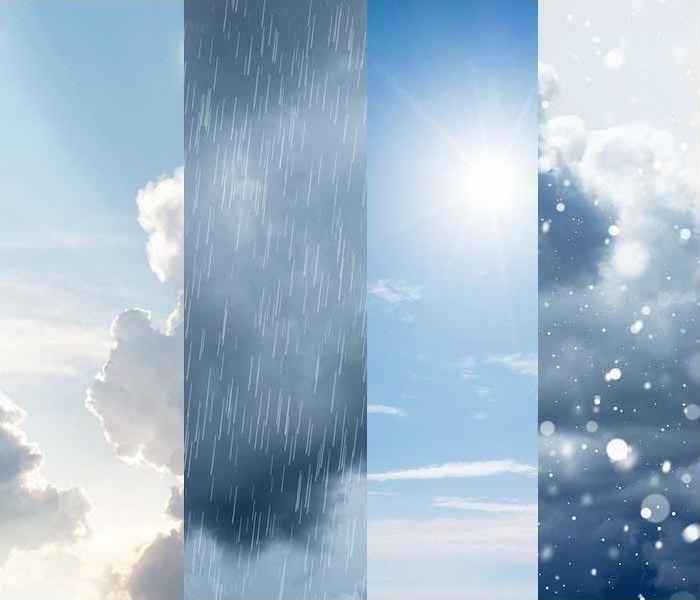 Extreme temperature changes can lead to severe weather. SERVPRO of Buford/Suwanee/Hamilton Mill is a click away if you experience any damage.
Extreme temperature changes can lead to severe weather. SERVPRO of Buford/Suwanee/Hamilton Mill is a click away if you experience any damage.
The United States is one of the world's largest countries, with a wide range of geographical features and varied landscapes. Different parts of the United States have different weather patterns. That means that some places have more dangerous and destructive weather than others.
Let's look at the weather patterns that may develop as spring approaches, when warm and cold air masses collide across the United States, and also what we can consider in Georgia.
The Pacific Northwest's spring months are prone to extreme rainfall, which may result in flooding and water damage. Snow will continue to accumulate at higher elevations, and the melting and runoff it produces can provide additional weather challenges.
The Northern states of Maine, New Hampshire, Vermont, Massachusetts, Connecticut, and Rhode Island will endure through the coldest weather. From Maine to North Dakota, people can anticipate chilly conditions and the potential for blizzards and significant snow even into late spring or early summer.
The Southwest and southern West Coast, on the other hand, should expect intense heat waves that may harm people and property. Hawaii will continue to be on high alert for tectonic activity-induced tsunamis in the South Pacific region, which includes Tahiti and Samoa.
From Iowa to Texas, the Midwest will need to be cautious for windstorms, Derechos, and potential wildfires, which might spread rapidly when winds are high and conditions are dry. Tornado Alley is one of the most hazardous regions in the world for tornadoes.
Finally, in the Southeast, we can anticipate a broad selection of severe weather events, including thunderstorms and tornadoes in landlocked regions, as well as early-season hurricanes along the coast later in the spring. Late-season snow has afflicted several locations throughout Middle Tennessee.
Extreme weather may occur in any location in the United States. While it varies from state to state, being aware of and prepared for severe weather is never a bad idea.
Help is only a phone call away if you suffer severe weather-related damage caused by water, fire, or other elements. Call our SERVPRO team for prompt, professional restoration.
Secondary Damage: Finding Mold After a Flood
1/12/2022 (Permalink)
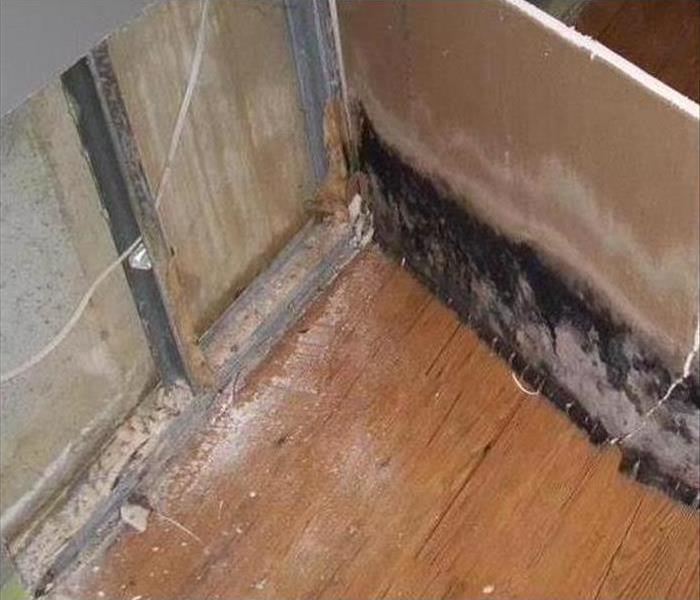 Mold hiding inside a wall.
Mold hiding inside a wall.
Finding Mold After a Flood
If a storm causes water damage to your home, there are many good reasons to get the problem taken care of as soon as possible. Avoiding mold growth is one of the main benefits of quick mitigation. When many homes in Buford, GA, are affected by the same storm, however, water restoration specialists may not get to your repairs before mold starts to grow. It can take as little as 24 hours for a mold problem to begin. When that happens, the technicians may need to add mold remediation to their task list to fix the secondary damage. Here are the steps they take to do that.
1. Remove Water
Water is a major contributing factor to developing mold issues, so it makes sense that in order to combat mold, all standing water must be removed. After that happens, surfaces must be dried.
2. Isolate Affected Area
Because mold spores are airborne, the area containing the mold growth needs to be shut off from the rest of the house. This prevents it from spreading to other areas.
3. Remove Damaged Materials
Everything that the mold touches must be removed from the area. This not only includes items in the space but the parts of the structure, such as walls or flooring, that show signs of mold as well.
4. Clean the Area
Mold tends to latch on to dirt and bacteria. Disinfecting the area makes it less hospitable to any spores that are looking for a place to land.
5. Test the Area
After all visible traces of mold are removed, the problem is likely resolved. To be sure, however, experts can test the area for concentrated patches of mold to ensure that they didn't miss anything.
The best way to treat mold growth, of course, is to prevent it. If you don't get to it in time, however, experts can perform these mold remediation steps to get rid of the problem.
3 Tips for Getting Rid of Flood Odors
11/10/2021 (Permalink)
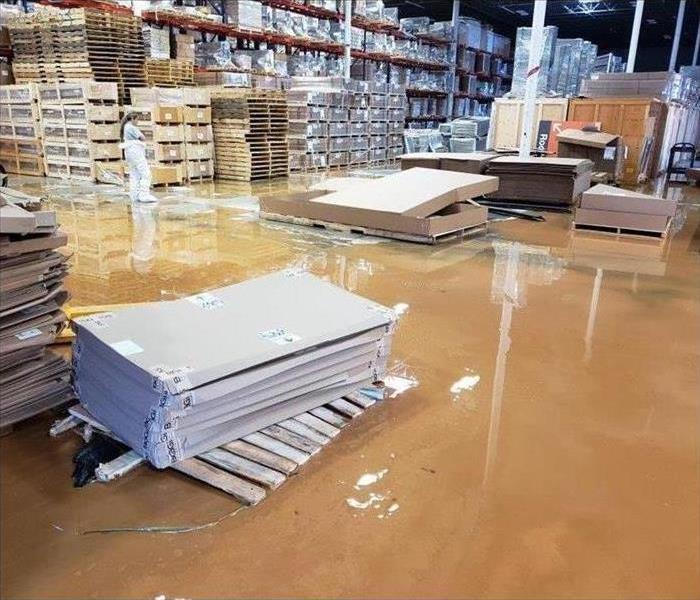 A flooded warehouse in Hamilton Mill, GA.
A flooded warehouse in Hamilton Mill, GA.
How To Get Rid Of Flood Odors In Your Building
It isn't uncommon for musty odors to remain after the flood water has affected your building. Unfortunately, those smells generally signal mold growth and won't just go away with time. The good news is that there are steps you can take to get rid of those smells and protect the structure of your building in the process.
1. Completely Dry the Area
There are several methods of drying out rooms in your building, such as opening windows to provide plenty of ventilation, running dehumidifiers to pull moisture from the air and the carpets, and installing floor fans to increase circulation at carpet level. Don't forget to pay attention to the corners of the room and other out-of-the-way areas. These spots are notorious for remaining moist and harboring colonies of mold.
2. Treat Carpeting and Other Materials With Disinfectants
Some of the chemicals used to treat mold and other odors associated with flooding are necessarily potent. Water restoration professionals have these disinfectants and the training necessary to use them safely, so consider scheduling an appointment with those professionals early on in the process. If only a small area has been affected, you may consider using a vinegar/water mixture to spot-treat. Just be careful not to use too much of the mixture or you'll trigger increased mold growth.
3. Treat Odors Topically
As you work on the underlying causes of odors, you may want to take steps such as using air fresheners or natural deodorizers, such as baking soda sprinkled on affected areas and bowls of vinegar placed around the room. Small bowls of cat litter will also absorb much of the odor in the space. As soon as your vinegar, baking soda, and cat litter have absorbed trouble odors, throw it out and replace it with a fresh bowl.
If you've experienced sewage loss during flooding, be aware of the dangers of coming into contact with raw sewage and the chemicals involved in treating sewage. It's best to contact trained professionals in Hamilton Mill, GA, to resolve mold growth in those situations.
Water Damage Remediation Process
10/18/2021 (Permalink)
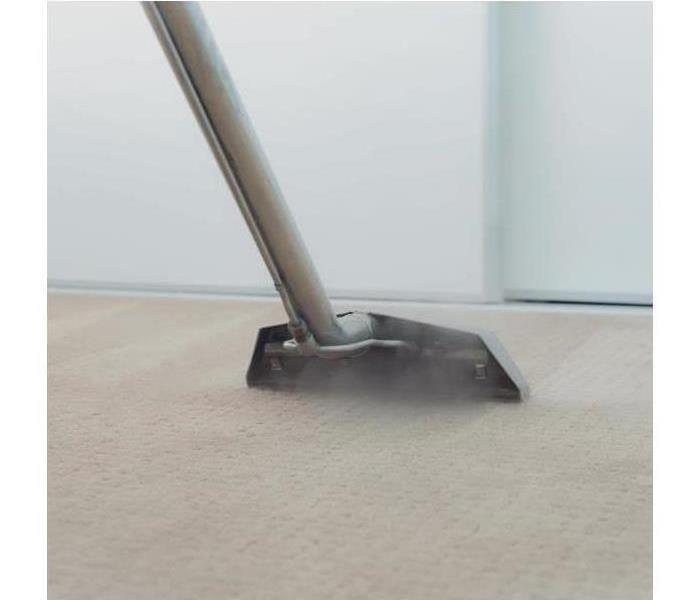 Use specialized vacuums to extract standing water.
Use specialized vacuums to extract standing water.
Water Damage Remediation Process
If your Rest Haven, GA, business experiences flooding, mold growth can follow soon after. It is important to act quickly to minimize further damage. The following steps outline the water-damage remediation process:
1. Document the damage. Before you begin drying out the property, make sure to document the damage. Take a detailed photo and video evidence for your insurance company. As you work on cleaning up, make a list of all damaged items, when you purchased them and how much you paid for them.
2. Remove standing water. Use pumps or specialized vacuums to extract standing water. You can also use buckets to scoop out the water.
3. Dry remaining water. Even after most of the water has been removed, mold growth can still be a problem if furniture, documents or other items are left wet. Fans and dehumidifiers can help with the drying process. If the humidity outside is low, you can open windows and doors to increase airflow.
4. Clean and sanitize affected items. The type of floodwater will determine the best cleaner for your items. If the water came from a clean water indoor pipe, a standard household cleaner should be sufficient. However, if the floodwater contains bacteria, you will need a stronger disinfectant. Anything that cannot be fully dried and sanitized should be thrown away. Professional restorers can help you determine what is and is not salvageable.
5. Repair and replace damaged objects. When everything is clean and dry, you can begin making repairs to your building and bringing in replacement items. Some of these repairs, such as painting, you may be able to do yourself. Delicate objects, such as electronics, will likely require professional restoration.
Flooding can happen to any business, and the damage can be serious. If your commercial building suffers water damage or mold growth, a certified restoration service can help you get your business back to normal quickly and safely.
Flood Aftermath: Avoiding Mold
9/13/2021 (Permalink)
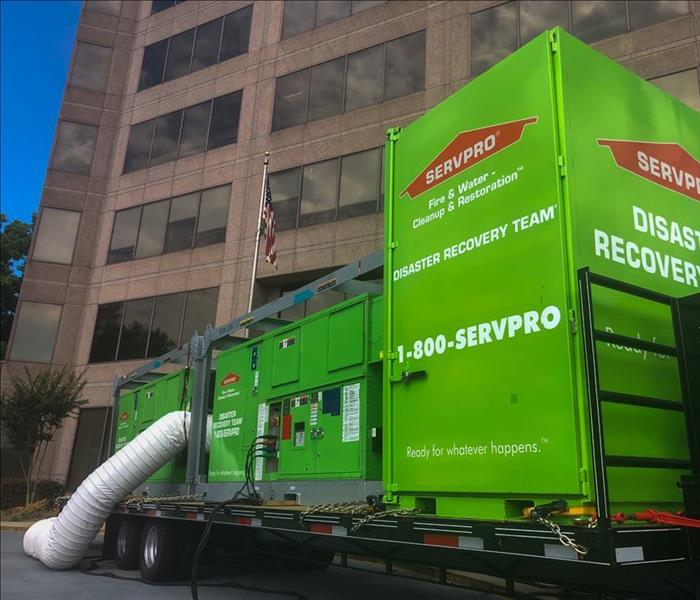 Prevention and timely remediation are the keys to avoiding mold growth.
Prevention and timely remediation are the keys to avoiding mold growth.
During storm season, your home in Buford, GA, is especially vulnerable to flooding. In addition to all the practical remediation steps for water damage, another problem to look out for is mold growth. It doesn't take long for mold patches to form when you have standing water. Knowing when to prepare for the possibility of fungus growth and the actions to take may help you avoid the problem.
Flooding Risk
Storms that produce a lot of rain also bring a higher risk of flooding. When there's more water than an area can hold or disburse, you may see some flooding in your home. Some areas are at higher risk than others:
• Areas near rivers and streams, especially if the terrain is hilly
• Densely populated areas, particularly those with poor drainage systems
• Locations that experience huge snowdrifts that eventually melt and runoff
• Places that experience sudden, intense rainfall
• Coastal areas at risk during hurricane season
If you live in any of these areas, your home is more likely to flood. If the flood is due to a natural disaster that affects a lot of people, you may have to take some measures into your own hands to avoid mold growth.
Mold Risk
Mold can attach and start to grow as soon as 24 hours after water damage has occurred. This process is accelerated if the water contains bacteria, as floodwater tends to do, since mold feeds on organic matter. Contaminated water is like a smorgasbord for mold, providing all the things it likes in one substance. All it needs is a surface to land on, and the fungus can begin to flourish. To discourage growth, guard your home against flooding. Keep drainage systems clear, and make sure your foundation is in good shape. If your home does flood, call water remediation specialists to alleviate the problem as soon as possible.
Prevention and timely remediation are the keys to avoiding mold growth. Your vigilance in this matter can keep your home from having mold damage on top of water damage.
Does My Business Need Flood Insurance?
6/14/2021 (Permalink)
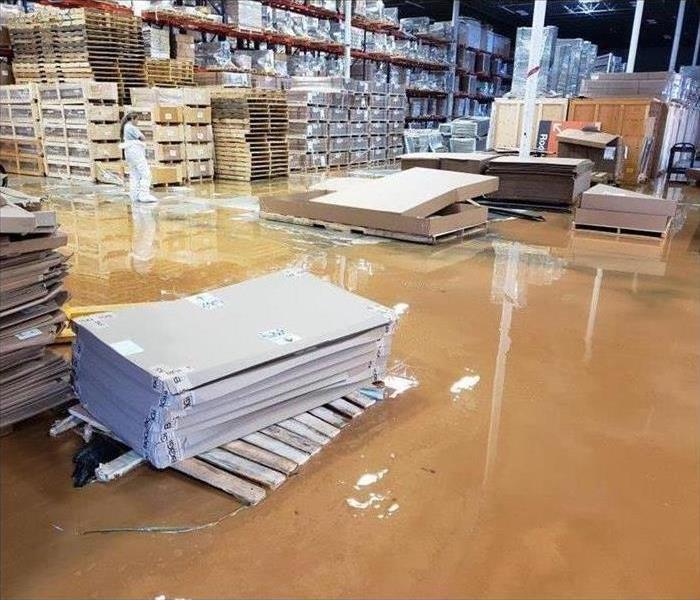 Flood damage in Dacula, GA.
Flood damage in Dacula, GA.
Flood Insurance for Business
Being a business owner means always thinking about your bottom line and always trying to cut costs where you can. You likely know that it’s a good idea to review your commercial insurance coverage periodically to be sure that, on one hand, you have enough coverage, and, on the other hand, you aren’t overpaying for coverage you don’t need. Flood insurance is a topic that often comes up during this type of coverage review: Do you need a flood policy? Asking yourself these three questions could help you determine whether you should have flood insurance in place for your Dacula, GA, business.
1. Is My Business Located Within a Flood Zone?
The U.S. Federal Emergency Management Agency has developed a series of maps that designate certain areas as flood zones. You can check your location’s flood zone designation here. If your building is located within a FEMA flood zone, your mortgage company requires you to maintain a flood policy in addition to other commercial insurance. If you don’t have a mortgage on the property, you may still want to carry flood insurance.
2. How Would a Flood Affect the Contents of My Business?
Take a moment to think about what sorts of items, inventory, and equipment are physically located in your business building and consider what would happen if the building were to be filled with an inch, or a foot, of floodwater. Are most of the business contents replaceable, or would a flood cause irreparable damage to original documents or one-of-a-kind equipment?
3. Do I Have Funds Available to Cover Flood Expenses Without Insurance?
Flood cleanup can be a long and expensive process. Water can damage flooring, drywall, furniture, electronics, and even your building’s framework. Without flood insurance, you would need to pay for cosmetic and structural repairs and other expenses such as water damage mitigation and mold control.
If your business is in a flood zone or stands to suffer significant damage in a flood, adding a flood policy to your commercial insurance portfolio is a smart decision that could keep you from paying thousands out of pocket.
Am I required to Have Commercial Flood Insurance?
3/30/2021 (Permalink)
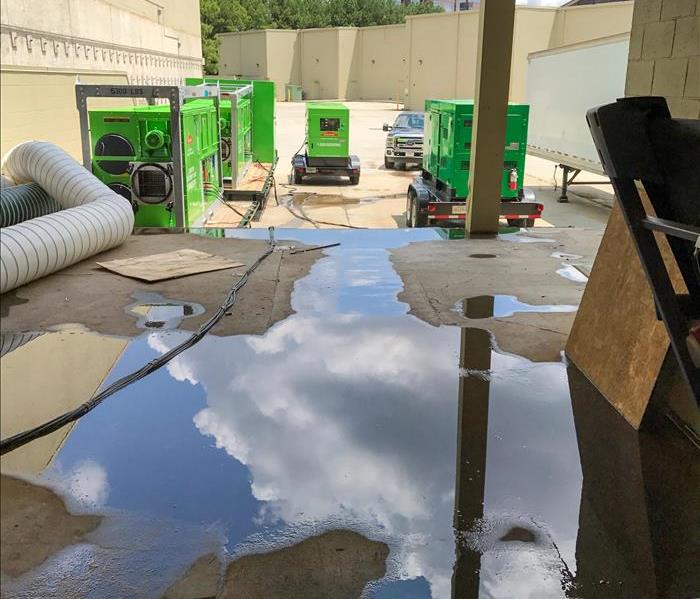 We can help remove the floodwater from your business.
We can help remove the floodwater from your business.
Three Factors That Will Determine If It's Mandatory
Floods are one of nature’s most destructive processes. They can have a terrible death toll and carry toxic residue into every nook and cranny of commercial buildings. Unfortunately, this damage isn’t covered by your commercial insurance policy.
If you want or need coverage, you’ll need either a rider from your insurance provider or you’ll have to purchase a special flood policy to be covered.
So, Is flood insurance optional? Well, that depends on your situation.
1. Are You in a High-Risk Flood Zone?
FEMA has flood maps available for much of the United States. If your building in Suwanee, GA is in a zone marked high-risk, you may have to have a flood policy. Some areas don’t have digital map data available, so you may have to consult your local authorities.
If your building is in a high-risk area, you probably should invest in flood coverage even if it's not required. Also, ask your local water damage restoration expert about having an assessment done on the property and develop an emergency plan in case of disaster.
Also, it’s always wise to consult flood maps before purchasing a commercial building. Local and state laws may require high-risk properties to be backfilled so the building is above the flood line, so definitely do your research!
2. Do You Have a Commercial Mortgage?
If a building has a mortgage on it, your lender may require you to have flood insurance. A few commercial insurance providers do have riders to cover flood damage, but most property owners prefer to use the NFIP flood policy, since it’s subsidized, lowering your premiums.
3. Is Your Lender Federally Insured?
To make mortgages more affordable, many are backed by federal insurance. These are typically called conventional mortgages. If you have a mortgage, your lender is covered by federal regulations and the building is in a high-risk flood zone, you’ll need coverage.
Ask your insurance agent or attorney if it applies to you. However, many experts recommend getting commercial flood insurance anyway. It can be the difference between closing your doors or staying open after a disaster.
Tips for Maintaining Your Sump Pump
1/15/2021 (Permalink)
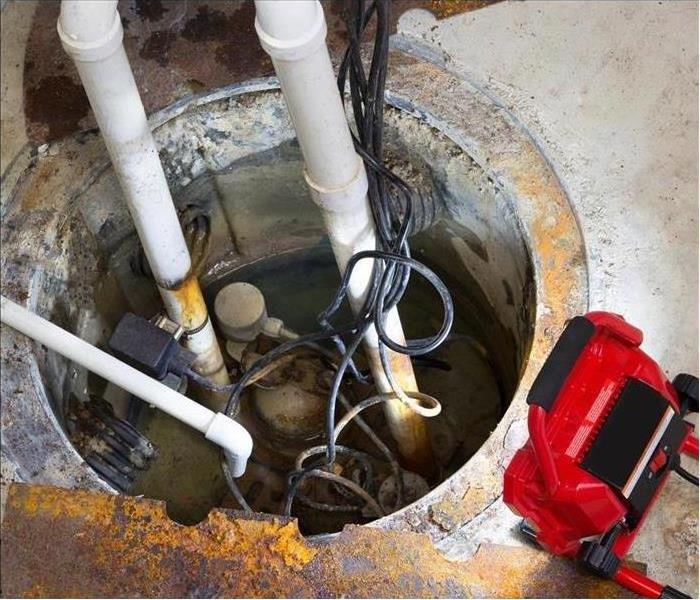 Ensure that your pump remains in good working order
Ensure that your pump remains in good working order
A sump pump drains water from the sump basin in the basement of your house in Hamilton Mill, GA. Regular pump maintenance will keep it in the best condition possible to keep your basement and entire home dry.
Keep It Clean
Water passing through the earth around your home can carry fine dirt particles that it deposits in the pump. It is necessary to clear these particles regularly to allow the pump to drain effectively. Unplug the pump and pour a bottle of vinegar into the sump pit. Allow the vinegar to sit for about 30 minutes to break up the debris before restoring the power. Flush out dirt particles by pouring hot water into the pit.
Perform Routine Inspections
Pump maintenance and inspections are essential for detecting problems and issues that can lead to costly basement flood damage repairs. Ensure that your pump remains in good working order by checking various features, including:
- Check valve. When the pump shuts off, this part prevents gravity from pulling water back into the pit. This part prevents pumped water from re-entering the sump pit where it requires repumping.
- Float. Checking the float for jams ensures that the pump turns on and off appropriately.
- Positioning. Ensuring the pump's upright position is necessary to prevent it from tipping over while vibrating.
- Cover. A poorly-fitting pump lid can elevate the humidity within a home, increasing the risk for damage from mold formation that requires the intervention of a professional mold remediation service.
- Alarm. If the pump malfunctions, a reliable alarm system can issue an alert to prevent a flood from occurring.
Install a Backup Generator
Power outages are common reasons for sump pump failures. A backup generator that kicks in during power outages will ensure the pump's uninterrupted function.
Routine sump pump inspections are a critical part of the measures necessary to maintain your home in Hamilton Mill, GA.
3 Ways To Directly Prevent Floods in Your Town
11/11/2020 (Permalink)
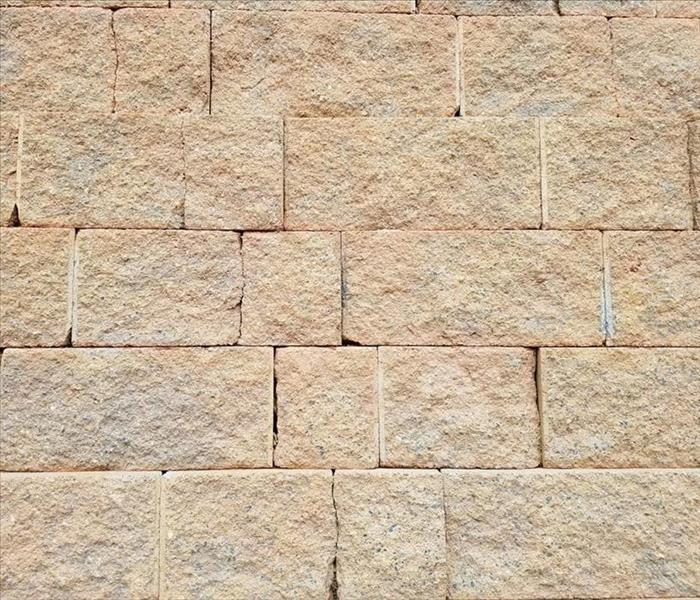 Retaining walls are built to separate land at two distinct heights
Retaining walls are built to separate land at two distinct heights
How To Prevent Floods Directly
Cleaning up after a flood in Suwanee, GA can be a long and arduous process. Therefore, you may save time, money and energy by proactively preparing for a stormwater issue. The money aspect is especially prevalent as insurance companies don't tend to cover flood cleaning. While some storm preparation techniques require years to come into effect, the following are three ways to prevent floods directly.
Plant Strategic Foliage
The plants throughout your town aren't just there to look pretty. There are many practical uses for this vegetation, one of which is flood prevention. Flooding water has a lot of force behind it. This force causes harmful erosion and the general build-up of water. Plants have the ability to combat this by acting as a blockade. The foliage can disrupt a current and spread the water. Here are a few plants that accomplish this:
Create Detention Basins
Since the flow of water is the main creation of flooding, utilizing a method that regulates it is wise. Detention basins are ponds that receive water and control its exit. These reservoirs are generally built near significant bodies of water, which promotes effectiveness. The basins are particularly successful at flood prevention due to the more detail-oriented structuring involved.
Construct Retaining Walls
Erosion is a particular issue caused by storms, but it can be lessened through the construction of retaining walls. Retaining walls are built to separate land at two distinct heights. While these walls may be chiefly meant to contain soil, the effect of detaching earth from the street is helpful. Water is forced to stay on the street and avoid picking up dirt.
If you are able to, it's better to prevent an issue than to confront it. The storm damage restoration process will be far easier if proactive measures are taken. Ergo, flood prevention is important to keep in mind for maintaining your city's welfare.
How To Prepare For a Canceled Flight
10/20/2020 (Permalink)
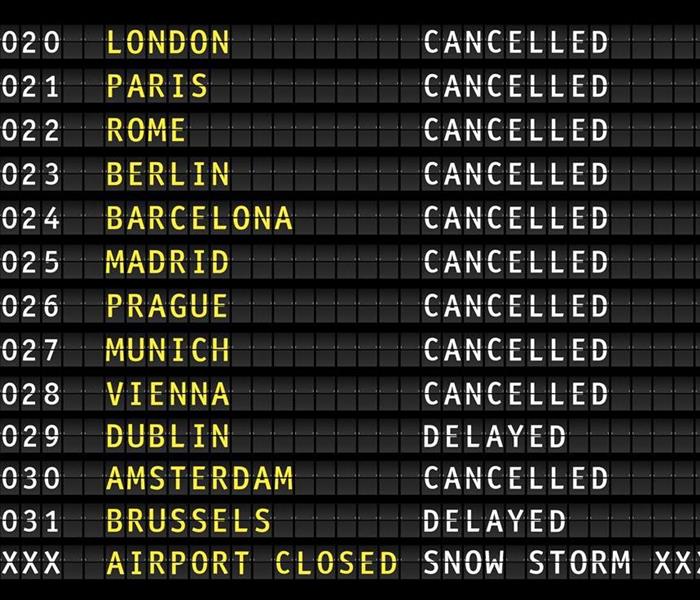 Canceled flight information board
Canceled flight information board
Prepare For a Canceled Flight
Traveling during the winter and fall from Dacula, GA can be risky. Storms can shut down entire cities, including their airports. Here are some things you can do to be prepared for a canceled flight.
1. Pack Light
If there is a threat of bad weather around the time that you're flying, set yourself up for success by packing light. It's much easier to switch flights quickly and end up with all your baggage if you pack in a carryon. If you do need to check it, make sure your carryon contains an extra change of clothes and the essential toiletries you'll need to survive without your suitcase for a night or two. Bring an external charger for your phone so that you aren't fighting the rest of the passengers on your flight for an outlet, and load your bag with plenty of snacks.
2. Call the Airline
If you do have a canceled flight, try calling the airline before you go to the customer service desk. This can often help you rebook faster since you aren't waiting in line. No matter who you talk to, though, remember to always be polite and gracious. It's not the customer service representative's fault that your flight was canceled, and they're the ones who are going to be able to help you. Make sure you ask about any compensation the airline can provide for you, like meal vouchers or a hotel room.
3. Get Comfortable
If it's looking doubtful that you're going to get another flight any time soon, turn your attention to booking a hotel room. It's likely that there was more than one flight that was canceled, so rooms may go quickly. Look up local storm tips to see what safety precautions you should be aware of while you're staying. If the area where you live is being hit, you can use this opportunity to look up a storm damage remediation company to call to take care of your home as well.
While a canceled flight can throw your day into chaos, being prepared for the possibility can make it go much more smoothly.
Preparing Your Business for a Hurricane or High Wind Event
9/9/2020 (Permalink)
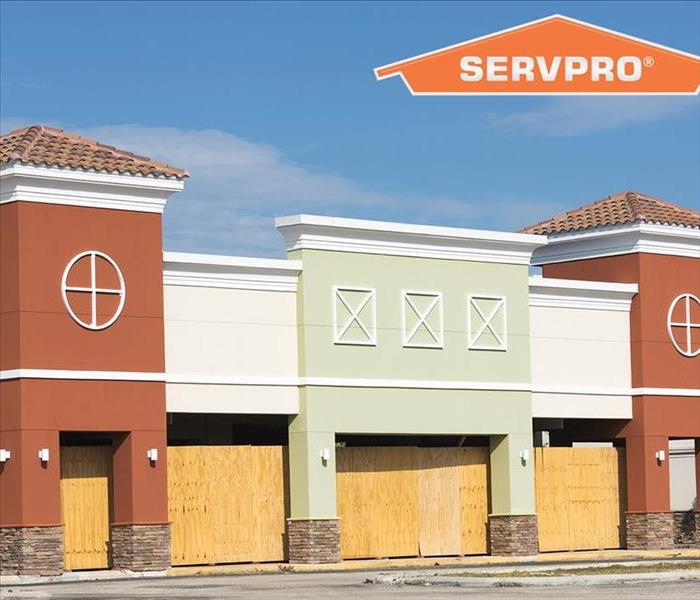 Board up building in Buford, GA
Board up building in Buford, GA
Ways To Prevent Storm Or Hurricane Damage From Your Business
If you own a commercial property in Buford, GA, you may be concerned about the possibility of sustaining damage during a high wind event. High winds, such as those caused by a hurricane, are notorious for wreaking havoc on valuable properties. There are, fortunately, a few things you can do to prevent storm or hurricane damage from hurting your business.
1. Be Prepared to For Power Failure and Isolation
You and your employees are the most important part of your business. This is why you should always have generators, blankets, food stocks, first aid kits, and other items on hand that make habitation easier during a disaster. Many preparatory items can also help you address building problems more quickly. Having working lighting, for example, can make it easier to spot a leak that needs to be addressed.
2. Protect Your Property
You should always regard everything you own as vulnerable to storm or hurricane damage. Any valuable documents should be backed up, and you should protect indispensable ones by waterproofing them. Raise electronics and appliances above ground level. Obviously, exterior surfaces like windows and doors are at the highest risk of storm damage. Purchasing shutters or carefully boarding up windows can protect them from debris made airborne by high winds.
3. Take Extra Precautions
Even if you have raised belongings and covered windows, it is still possible for property or items to sustain serious damage. Prepare for this possibility by sandbagging flood-prone areas and fastening furniture to wall studs. Before a storm makes landfall, utilities should be shut off so that any electronics still plugged in are safe from a power surge.
If your business has already suffered storm or hurricane damage, you should check if your insurance covers storm restoration. A restoration professional can expertly assess and remedy damage to structures, electronics, furniture, and other items. Although storm damage is often covered by insurance, it is always best to first prevent serious damage from occurring by taking appropriate precautions.
Tips to Keep Your Home Safe When You Are Away
8/7/2020 (Permalink)
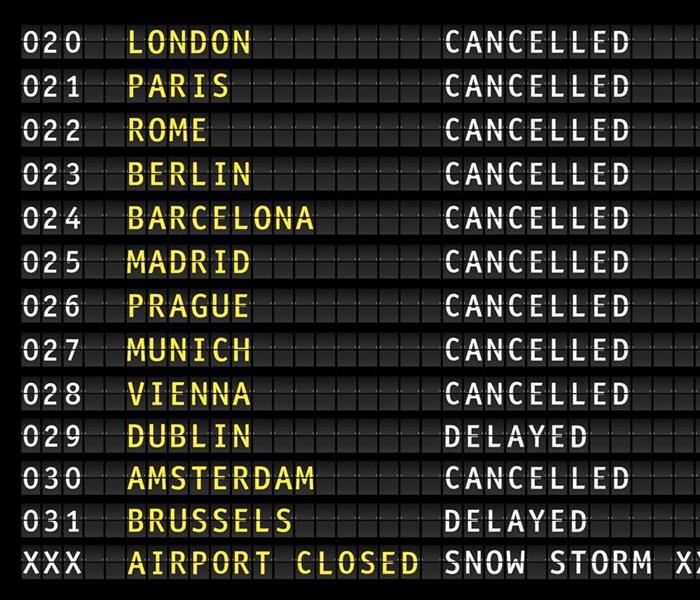 If your flight does get bumped, seek compensation from the airline
If your flight does get bumped, seek compensation from the airline
We all love vacations, but what happens if you become the victim of a canceled flight once it’s time to return? And what can you do to make sure your home in Sugar Hill, GA, stays safe in the event you become unexpectedly stuck abroad?
Making Your Flight
Travelers can reduce their chances of getting stranded in a foreign city by following a few simple rules:
- If possible, avoid booking a flight that may take place during your destination’s storm season. Weather-related apps can alert you to when storms are brewing, as well as provide other useful storm tips.
- Arrive at the airport early, allowing time for check-in, baggage check, security scans, and finding your gate. This process often takes longer than you may anticipate.
- Check your flight information, as departure details often change. Once you arrive at your gate, look twice to confirm that you are in the right place.
If your flight does get bumped, seek compensation from the airline. Be sure to book a hotel room sooner rather than later, as others have surely fallen victim to the same canceled flight or delay and local hotels may fill fast.
Protecting Your Home
Whether your absence is planned or not, you need to make sure your house remains secure. Provide a reliable neighbor or family member with a key so there will always be someone nearby to handle urgent situations. Place your mail on hold and don’t post your plans on social media; you never want to advertise your home’s vacancy to potential burglars. Likewise, have your residence fitted with a monitoring system that allows you to view your home from a phone or laptop. If you detect storm damage during your time away, you can contact a home repair specialist to resolve the issue before you even return.
Tourists will forever suffer from the occasional canceled flight, but commonsense preparation combined with prompt action can help assure that a homecoming never includes a nasty surprise.
3 Reasons Not To Drive on Flooded Streets
5/1/2020 (Permalink)
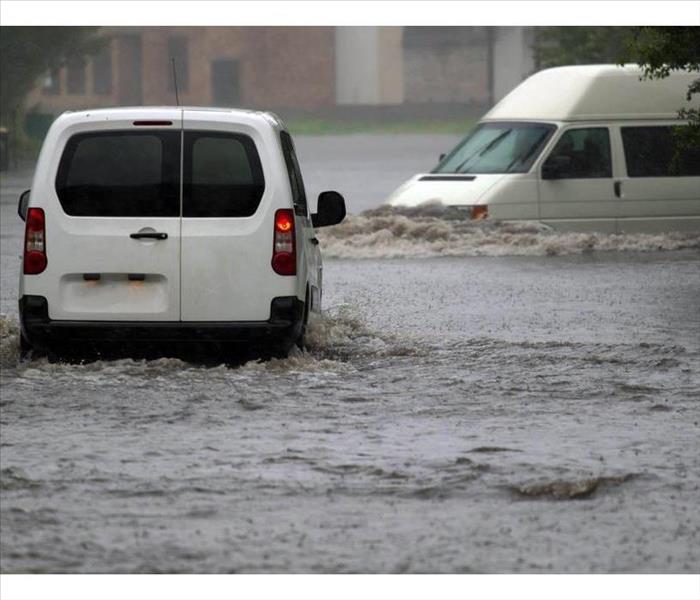 It is better to turn around, rather than take a chance on driving
It is better to turn around, rather than take a chance on driving
Three Reasons Not To Drive Through Floodwaters
The temptation to drive down a flooded street can be difficult to resist for many drivers. You have somewhere you need to be and you do not want to waste time looking for a way around. It is just a little bit of water and you do not think it looks that dangerous. However, floodwaters can be deceiving. These are three of the reasons you should not drive through floodwaters.
1. It Could Be More Dangerous Than You Think
Six inches of water on a flooded street can be all it takes to cause a vehicle's tires to lose traction, resulting in a loss of control of the vehicle. 12 inches of water can cause most vehicles to float, which can lead to the vehicle being swept off the road. It can often be difficult to visually judge the depth of floodwaters. For this reason, it is better to turn around, rather than take a chance on driving through what you think is a safe amount of water.
2. You Could Drown
According to the CDC, more than half of all flood-related drownings occur when people attempt to drive down flooded roads. In addition to putting the passengers in your vehicle at risk, first responders or bystanders who may attempt to assist you are also at risk of drowning.
3. Your Vehicle Could Be Destroyed
Driving through standing water can damage your vehicle's engine, brakes, power steering, and electrical systems. Even shallow waters can be sucked into your vehicle's engine, causing severe damage.
The dangers of driving down a flooded street are easy to misjudge and can result in the loss of your vehicle or even your life. In most situations, it is better to turn around and find another route to where you are going than to risk driving through floodwater. If you are experiencing flooding in Suwanee, GA, consult your local Department of Transportation for travel tips and consider contacting flood remediation specialists to assist you with any flood damage to your home.
 If you suspect any damage to your home from a recent storm, call SERVPRO of Buford/Suwanee/Hamilton Mill.
If you suspect any damage to your home from a recent storm, call SERVPRO of Buford/Suwanee/Hamilton Mill.





 24/7 Emergency Service
24/7 Emergency Service










